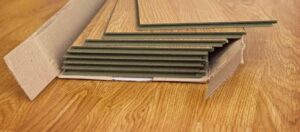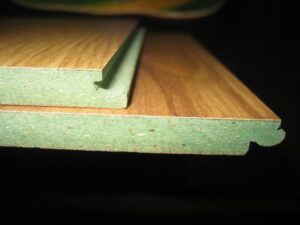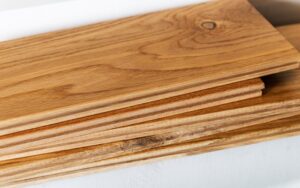We’ve all heard the saying, ‘bigger is better.’ But when it comes to flooring, does the same hold true? In this article, we delve into the question of whether thicker flooring is truly superior.
We’ll explore the benefits of choosing a thicker option, factors to consider when selecting flooring thickness, and how it can impact durability, noise reduction, insulation properties, installation considerations, maintenance, and even your home’s resale value.
So let’s dive in and find out if thicker flooring really lives up to the hype.
Key Takeaways Is Thicker Flooring Better?
- Thicker flooring offers noise reduction and improves soundproofing capabilities.
- It provides excellent thermal insulation, enhancing comfort and energy efficiency.
- Thicker flooring is more durable and long-lasting, with better resistance to wear and tear.
- Proper installation techniques and consideration of subfloor compatibility are important for successful installation of thicker flooring.
The Benefits of Thicker Flooring
Thicker flooring is definitely worth considering because it offers numerous benefits.
When it comes to noise reduction, thicker flooring materials such as carpets or underlays can significantly reduce the amount of sound that travels between floors. The added thickness helps absorb sound waves and minimize their transmission, making your space much quieter and more peaceful.

Additionally, thicker flooring provides excellent thermal insulation properties. It acts as a barrier against heat transfer, keeping your home warmer in the colder months and cooler during summer. This means you can save on energy costs by reducing the need for heating or air conditioning.
Thicker flooring not only enhances comfort but also contributes to creating a more energy-efficient and environmentally friendly living environment for everyone to enjoy.
Factors to Consider When Choosing Flooring Thickness
When it comes to choosing flooring, there are several factors to consider that can greatly impact the overall quality and performance.

One important factor is noise insulation benefits, which can reduce sound transmission and create a quieter environment.
Additionally, durability and longevity are key points to consider as they determine how well the flooring will withstand everyday wear and tear over time.
Noise Insulation Benefits
To reduce noise and enjoy a quieter living space, you’ll love the benefits of thicker flooring. Thicker flooring offers excellent insulation effectiveness and soundproofing capabilities, making it an ideal choice for those seeking a peaceful environment.

With its increased thickness, this type of flooring provides an additional layer of protection against sound transmission from both the floor below and outside sources. The extra thickness helps to absorb impact sounds and reduces the transfer of noise between rooms, creating a more serene atmosphere.
Thicker flooring also minimizes vibrations that can amplify noise, ensuring that disturbances are kept to a minimum. So if you’re looking for a solution to enhance your home’s acoustic performance and create a more tranquil setting, thicker flooring is definitely worth considering.
Durability and Longevity
If you choose a thicker flooring option, you’ll be pleased with its durability and long lifespan. Thicker floors have several advantages when it comes to durability. They are more resistant to wear and tear, making them ideal for high-traffic areas in your home or office.
The extra thickness provides added protection against scratches, dents, and other forms of damage that can occur over time. Additionally, thicker flooring options tend to have better impact resistance. This means that they can withstand heavy objects being dropped on them without getting damaged easily.
Whether it’s the daily hustle and bustle of a busy household or the occasional mishap, choosing a thicker flooring option ensures that your floors will stand the test of time and maintain their beauty for years to come.
Durability and Longevity of Thicker Flooring
When it comes to flooring, the thickness of the material plays a crucial role in its durability and longevity. Thicker floors tend to last longer due to their increased strength and resistance to wear and tear.
Additionally, the thickness of the flooring directly impacts its ability to withstand heavy foot traffic and other daily stresses, making it an important factor to consider when choosing the right flooring option for your space.
Thicker Floors Last Longer
Thicker floors typically last longer due to their increased durability. When comparing thicker floors to thinner ones, the benefits of opting for a thicker flooring become evident. Here are some reasons why thicker floors have an edge over their thinner counterparts:
- Enhanced resistance: Thicker floors offer better resistance against wear and tear, making them more capable of withstanding heavy foot traffic.
- Reduced noise transmission: Thicker flooring materials absorb sound vibrations, resulting in a quieter space compared to thinner options.
- Improved stability: The extra thickness provides greater stability and reduces the chances of flexing or warping over time.
In summary, choosing thicker flooring offers advantages such as increased durability, reduced noise transmission, and enhanced stability. These benefits make it clear why opting for a thicker floor can be a wise investment in the long run.
Speaking of thickness and floor strength…
Thickness and Floor Strength
When considering the strength of your floor, you’ll want to focus on the thickness and its impact on durability.
Floor thickness plays a crucial role in ensuring safety and longevity. Thicker flooring provides several advantages that contribute to its overall strength.
Firstly, it offers better resistance against heavy foot traffic and potential damage from furniture or other objects. Additionally, thicker floors have enhanced sound insulation properties, reducing noise transmission between levels.
Furthermore, they provide a more stable base for installation, minimizing the risk of warping or buckling over time. Thicker flooring also allows for easier maintenance and refinishing as it provides more material to work with.
Overall, investing in thicker flooring not only enhances safety but also ensures a longer lifespan for your floors.
Noise Reduction With Thicker Flooring
Installing thicker flooring can significantly reduce noise levels in a room. When it comes to noise reduction, soundproofing is crucial, and thicker flooring plays a vital role in achieving this.
Here are three reasons why thicker flooring is better for noise reduction:
- Enhanced Sound Insulation: Thicker flooring acts as a barrier against sound transmission. It absorbs airborne sounds and reduces impact noises such as footsteps or furniture moving.
- Reduced Echoes: Thicker flooring helps minimize echoes by dampening the reverberation of sound waves within a space. This creates a more pleasant and comfortable acoustic environment.
- Noise Barrier: Thicker flooring provides an additional layer of insulation between different floors or rooms, effectively preventing sound from traveling through walls and ceilings.
Insulation Properties of Thicker Flooring
If you want to reduce noise and create a more comfortable living space, consider opting for flooring materials with enhanced insulation properties. Thicker flooring can provide better insulation performance, helping to minimize the transmission of sound and increase energy efficiency in your home.
The thickness of the flooring material plays a crucial role in its ability to block noise and maintain temperature. Thicker materials, such as cork or rubber, have higher density and are more effective at absorbing sound vibrations. This results in reduced noise levels between floors and rooms.
Additionally, thicker flooring provides better thermal insulation by preventing heat loss through the floor, which can contribute to improved energy efficiency in your home.
Thicker Flooring and Foot Comfort
In our previous discussion about the insulation properties of thicker flooring, we explored how it can help regulate temperatures and reduce energy costs. Now, let’s shift our focus to another benefit of thicker flooring: foot comfort.
When it comes to foot health, impact absorption plays a crucial role in ensuring overall well-being. Thicker flooring provides an extra layer of cushioning that helps absorb the shock generated from walking or standing for extended periods. This enhanced impact absorption not only reduces stress on your joints and muscles but also minimizes the risk of injuries such as sprains or fractures.
So, when you opt for thicker flooring, you’re not only creating a more comfortable living space but also prioritizing your long-term foot health.
Let’s dive deeper into why thicker flooring is beneficial for foot comfort:
- Enhanced Cushioning:
Thicker flooring materials like carpet or padded vinyl provide a softer surface underfoot. The additional padding acts as a buffer between your feet and the hard subfloor, reducing pressure points. - Shock Absorption:
Thicker floors have better shock-absorbing properties due to their increased density. They effectively absorb the impact of each step, preventing excessive strain on your feet and lower limbs. - Joint Protection:
By reducing the force transmitted through your joints with every step, thicker flooring can alleviate discomfort caused by conditions like arthritis. It promotes proper alignment and lessens wear and tear on vulnerable joint structures.
Investing in thicker flooring not only enhances the aesthetic appeal of your home but also takes care of your precious feet. With its superior impact absorption capabilities, this type of flooring ensures optimal foot health and contributes to an overall comfortable living environment.
Installation Considerations for Thicker Flooring
When choosing to install thicker flooring, you’ll want to consider the type of subfloor you have and its compatibility with the chosen material. Thicker flooring offers numerous benefits such as enhanced durability, better insulation, and improved soundproofing. However, it also requires careful installation considerations.
One important tip is to choose the right underlayment for your thicker flooring. Underlayment acts as a cushioning layer between the subfloor and the new floor, providing extra support and reducing noise transmission. It also helps to smooth out any imperfections in the subfloor, ensuring a level surface for installation.
When selecting underlayment, factors like moisture resistance, thermal insulation properties, and compatibility with your chosen flooring should be taken into account. By choosing the right underlayment and following proper installation techniques, you can ensure a successful and long-lasting installation of your thicker flooring.
Maintenance and Cleaning of Thicker Flooring
To keep your thicker floors looking their best, regular maintenance and cleaning is essential. Here are some maintenance tips to help you maintain the beauty and longevity of your thicker flooring:
- Sweep or vacuum regularly: Remove loose dirt and debris from the surface of your floors to prevent scratching.
- Use a damp mop: For deeper cleaning, use a well-wrung mop with a mild cleaner specifically designed for your type of flooring.
- Avoid excessive moisture: Thicker floors can be more resistant to water damage, but it’s still important to clean up spills promptly and avoid excessive moisture.
When it comes to choosing the best cleaning products for your thicker floors, consider these options:
- pH-neutral cleaners: These gentle cleaners are safe for most types of flooring and won’t leave behind residue.
- Microfiber mops or cloths: These tools effectively trap dirt and debris without scratching the surface.
- Manufacturer-recommended products: Check with the manufacturer for specific product recommendations that are suitable for your thicker flooring.
Cost Analysis of Thicker Flooring
When considering flooring options, it’s important to take into account the cost comparison between thicker and thinner materials.
Thicker flooring may have a higher upfront cost, but it often offers long-term durability benefits that can save you money in the long run.
Cost Comparison: Thicker Vs. Thinner
You’ll find that thicker flooring often comes with a higher price tag compared to thinner options. However, the cost comparison is not the only factor to consider when deciding between thick and thin flooring. Here are some installation options to keep in mind:
- Floating: Thinner floors are commonly used for floating installations, where they are laid over an underlayment without being attached to the subfloor. This can be a quick and easy DIY project.
- Glue-down: Thicker flooring is usually recommended for glue-down installations. The additional thickness provides better stability and reduces the risk of shifting or warping over time.
- Nail-down: Thicker hardwood or engineered wood flooring is ideal for nail-down installations. The extra thickness allows for secure attachment to the subfloor using nails or staples.
Considering these installation options, it’s important to weigh them against your budget and long-term durability benefits before making a decision on whether thicker or thinner flooring is better suited for your needs.
Long-Term Durability Benefits
When considering the question of whether thicker flooring is better, it’s important to look beyond just the cost comparison. Thicker flooring offers several long-term durability benefits that can make it a superior choice in certain situations.
One of the main advantages of thicker flooring is its longevity. The extra thickness provides added strength and resistance to wear and tear, making it more durable and less prone to damage over time. This means that thicker flooring can withstand heavy foot traffic, furniture movement, and other daily stresses without showing signs of wear as quickly as thinner options.
Another benefit of thicker flooring is noise reduction. The additional layer helps to absorb sound vibrations, reducing the amount of noise that travels through the floor. This can be particularly advantageous in multi-story buildings or rooms where noise control is important, such as bedrooms or home offices.
To further illustrate the advantages of thicker flooring, here is a table showcasing its key features:
| Longevity Advantages | Noise Reduction |
|---|---|
| Increased durability | Less sound transmission |
| Enhanced resistance to wear and tear | Quieter living environment |
| Can withstand heavy foot traffic | Ideal for multi-story buildings |
Thicker Flooring and Resale Value of Your Home
Thicker flooring can increase the resale value of your home. When potential buyers walk into a house, one of the first things they notice is the floor. Having thicker flooring not only adds an immediate visual appeal but also gives the impression of durability and quality. Here are some reasons why thicker flooring can positively impact the resale value:
- Enhanced durability: Thicker flooring is less prone to wear and tear, making it an attractive feature for buyers seeking long-lasting solutions.
- Noise reduction: Thicker flooring helps to absorb sound, creating a quieter environment, which is particularly appealing in multi-story homes or apartments.
- Comfort underfoot: Thicker floors provide better cushioning and insulation, offering a more comfortable walking experience.
Frequently Asked Questions
How Does the Thickness of Flooring Affect Its Overall Appearance?
The thickness of flooring affects its overall appearance by impacting durability and aesthetic appeal. Thicker flooring tends to be more durable, providing better resistance against wear and tear, while also offering a more substantial and visually pleasing look.
What Are the Disadvantages of Choosing Thinner Flooring?
Choosing thinner flooring has several disadvantages. It can have a negative impact on durability, making it more prone to damage and wear over time. Additionally, thinner flooring may lack the sound insulation and stability that thicker options provide.
Does the Thickness of Flooring Impact Its Ability to Withstand Heavy Foot Traffic?
Yes, the thickness of flooring does impact its ability to withstand heavy foot traffic. Thicker flooring provides better durability and can handle more wear and tear, reducing maintenance requirements in high-traffic areas.
Can Thicker Flooring Help to Reduce Heating and Cooling Costs in a Home?
Thicker flooring can enhance thermal insulation and improve energy efficiency in a home. It helps to reduce heating and cooling costs by providing better insulation against temperature changes, making it a wise investment for homeowners.
Are There Any Specific Types of Flooring That Benefit More From Being Thicker?
There are specific types of flooring that benefit more from being thicker. Thicker hardwood and laminate flooring, for example, offer enhanced durability and stability. However, it’s important to consider the pros and cons before making a decision.
Conclusion
In conclusion, it’s clear that thicker flooring offers numerous benefits for homeowners. Enhanced durability, longevity, noise reduction, and insulation properties are just a few of the advantages. Installation considerations and maintenance may require more effort, but they’re worth it in the long run. Despite a higher upfront cost, the resale value of your home will undoubtedly increase. So why wait? Upgrade to thicker flooring and transform your space into a luxurious haven that will leave everyone awe-struck.




